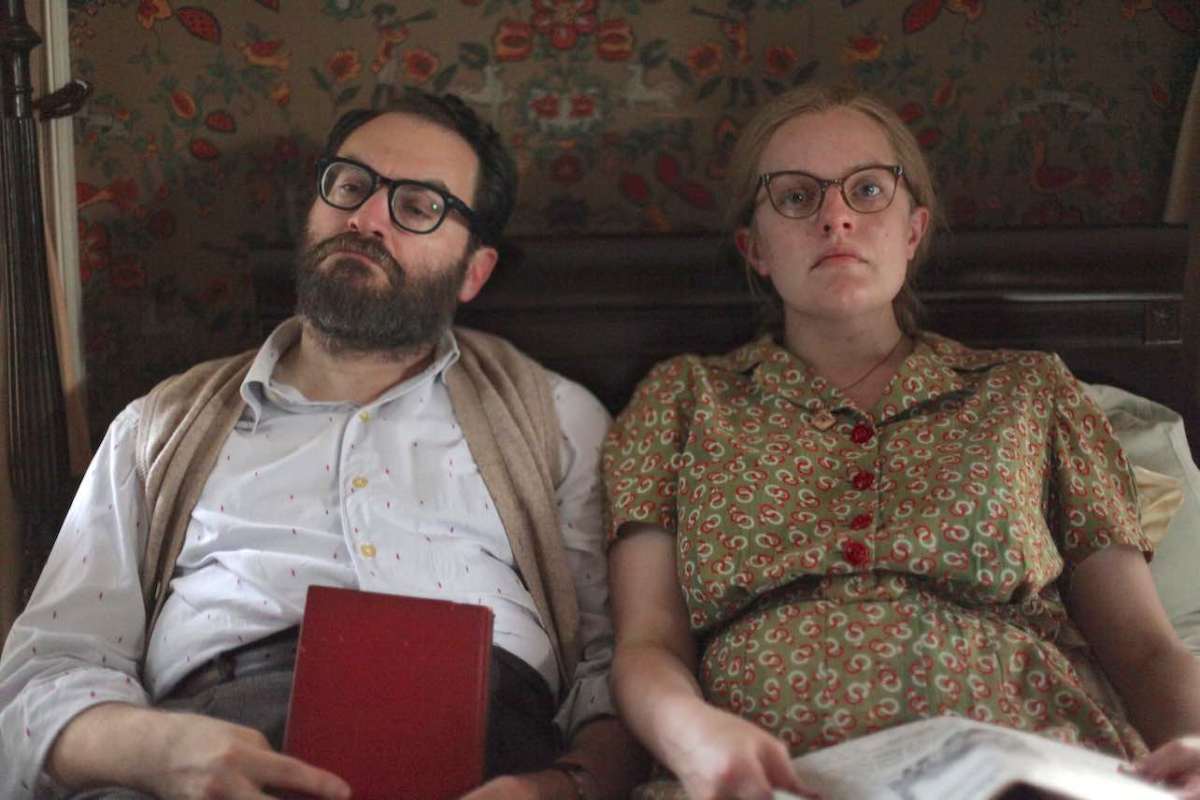
The fictional tale of Shirley finds renowned writer Shirley Jackson (Elizabeth Moss) in the process of trying her hand at writing a novel when her husband Professor Stanley Hyman (Michael Stuhlbarg) invites a newlywed young couple Fred and Rose Nemser (Logan Lerman and Odessa Young) to stay in their home as the groom works toward his own professorship at Bennington College in Vermont. The groom’s young wife upends Shirley’s meticulous routine and the presence of the couple heightens tension in the already combustible marriage between Shirley and Hyman.
The issue at the center of the film is that of female spouses, their role in the lives of their successful and highly visible male spouses, and the effect this has on how these women see themselves. The relationship between Rose and Shirley begins contentiously, until the pair find their groove working together to craft Shirley’s novel Hangsaman, based on a female student at Bennington who has disappeared. Shirley sees a bit of herself in the missing woman, who see frames as the latest example of women “cannot make the world see them.” Indeed, in Rose and Shirley we see two women who believed they were bonding over the drafting of a novel, but instead found each other shrunken in the shadows of their husbands and drew upon one another in order to discover their senses of self.
The history of the western world has mostly been about the archetype of the dutiful, doting housewife, there to support to her husband’s endeavors and take care of the household while he provided and built the career cachet that came along with it. As the successes of second wave feminism propelled women into the workforce and careers of their own, women found themselves having to face a balancing act of wanting to reach individual achievements while maintaining traditional relationships with male partners and the resulting tensions between the two. The women in Shirley find themselves at different stages of this conundrum with Shirley, the elder wife who has dealt with this for years at her wits end with having to manage her husband’s control and criticism of her writing aspirations and Rose the newlywed who slowly comes to realize what being the wife of a young, successful tenured professor may mean for her marriage and sense of self-worth. In each other, they find strength in finding their voices in dealing with the shared experience of dealing with being overshadowed within the marriages; Shirley, after years of torment, and Rose, as she begins her journey.
In terms of the acting contained within the film, Shirley most serves as a vehicle for the renowned talents of Elizabeth Moss and Michael Stuhlbarg. This marks the second awards-worthy performance from Moss within the past four months, allowing her to display her the full extent of her skills as a woman facing mental issues as well as the emotional manipulation of a narcissistic husband. Moss transforms herself into the legendary Jackson completely embodying the eccentric, exaggerated version of the author as portrayed in the script. The now trademark emotional range of Moss is here for all to see from the character’s rage and frustration to her sadness, confusion, and loneliness. Stuhlbarg is also his usual magnificent self, bringing a particularly believable and convincing smarminess as a professor who is lecherous with young women and domineering over his brilliant wife.
Shirley is interesting in the superb performances it offers from the perennially great Elizabeth Moss and Michael Stuhlbarg, but the film as a whole struggled to be engaging or interesting throughout. Director Josephine Decker offers some interesting elements in the film surrounding Shirley and Rose’s psychological states, whether it’s their brief flirtation with a lesbian affair, or each woman’s projection of the other onto the missing young woman at the center of Hangsaman with Shirley briefly visualizing Rose as the young woman or Rose wondering if Shirley and Stanley could have been involved with the disappearance. Director of photography Sturla Brandth Grøvlen also does well in visually transporting the audience into the time period and crafting some beautiful scenes and framework of the actors. Despite the stellar performances and promising elements, the film does not manage to draw you into its story or create an strong connection between the viewer and its characters.
Image: NEON

